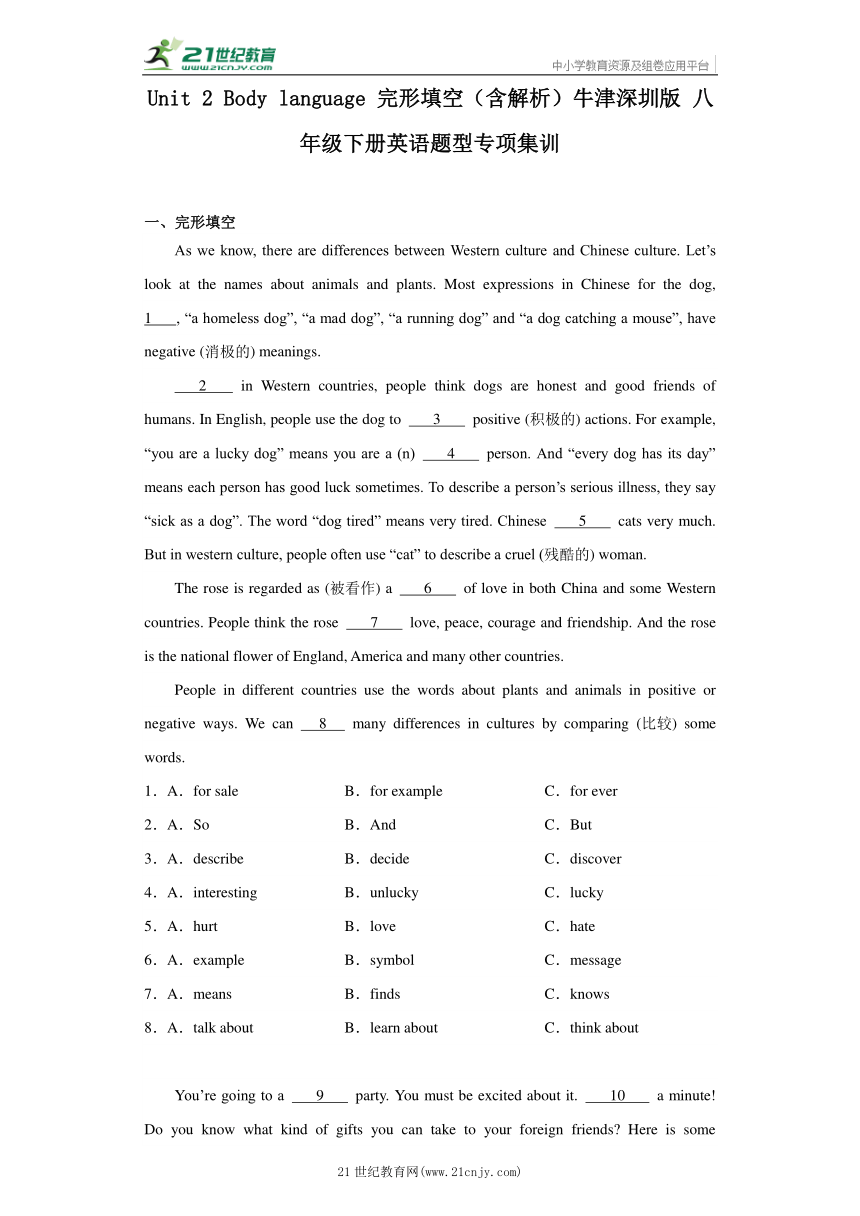
Unit 2 Body language 完形填空(含解析)牛津深圳版 八年级下册英语题型专项集训 一、完形填空 As we know, there are differences between Western culture and Chinese culture. Let’s look at the names about animals and plants. Most expressions in Chinese for the dog, 1 , “a homeless dog”, “a mad dog”, “a running dog” and “a dog catching a mouse”, have negative (消极的) meanings. 2 in Western countries, people think dogs are honest and good friends of humans. In English, people use the dog to 3 positive (积极的) actions. For example, “you are a lucky dog” means you are a (n) 4 person. And “every dog has its day” means each person has good luck sometimes. To describe a person’s serious illness, they say “sick as a dog”. The word “dog tired” means very tired. Chinese 5 cats very much. But in western culture, people often use “cat” to describe a cruel (残酷的) woman. The rose is regarded as (被看作) a 6 of love in both China and some Western countries. People think the rose 7 love, peace, courage and friendship. And the rose is the national flower of England, America and many other countries. People in different countries use the words about plants and animals in positive or negative ways. We can 8 many differences in cultures by comparing (比较) some words. 1.A.for sale B.for example C.for ever 2.A.So B.And C.But 3.A.describe B.decide C.discover 4.A.interesting B.unlucky C.lucky 5.A.hurt B.love C.hate 6.A.example B.symbol C.message 7.A.means B.finds C.knows 8.A.talk about B.learn about C.think about You’re going to a 9 party. You must be excited about it. 10 a minute! Do you know what kind of gifts you can take to your foreign friends Here is some 11 . In some foreign countries, some gifts 12 kites, chopsticks (筷子), or an erhu may be people’s favorites. Use beautiful paper to wrap (包装) the gifts. Remember 13 white, black or brown paper. These colors may make them unhappy. It’s 14 for the wrapping paper to have more colors on it. For Japanese, gifts like pens or tea 15 nice. They don’t like big gifts. For Frenchmen, gifts like candy, wine or books are great. British people and Americans like flowers, wine and chocolate, and you can relax and take it easy at 16 parties. In Arab countries, it’s not polite (礼貌的) to give a gift to someone when you meet him or her for the 17 time. Isn’t that interesting You can give a gift when you meet the second time or later. If you know this habit, you can know 18 to give gifts more politely. 9.A.cousin’s B.foreigner’s C.classmate’s D.teacher’s 10.A.Wait B.Expect C.Discuss D.Catch 11.A.news B.reason C.step D.advice 12.A.with B.through C.like D.by 13.A.to use B.using C.not to use D.not using 14.A.better B.easier C.worse D.earlier 15.A.am B.is C.are D.be 16.A.your B.their C.his D.our 17.A.first B.second C.third D.last 18.A.what B.where C.why D.how When was the last time you gave or received a hug Do your parent ... ...
~~ 您好,已阅读到文档的结尾了 ~~

